人教版高二英语必修5 Unit1 Great Scientists Grammar 过去分词作定语公开课课件(共36张PPT)
文档属性
| 名称 | 人教版高二英语必修5 Unit1 Great Scientists Grammar 过去分词作定语公开课课件(共36张PPT) | 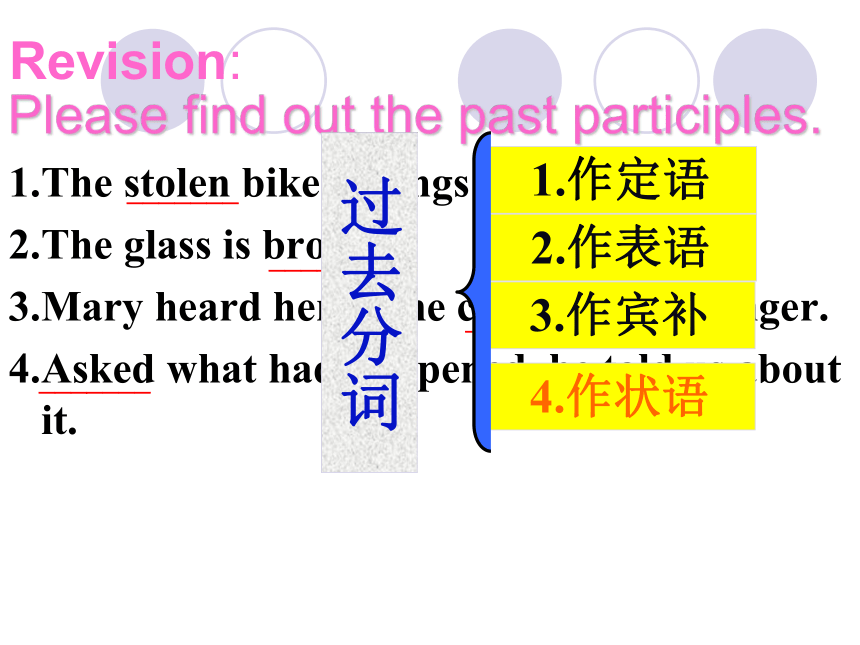 | |
| 格式 | ppt | ||
| 文件大小 | 960.0KB | ||
| 资源类型 | 教案 | ||
| 版本资源 | 人教版(新课程标准) | ||
| 科目 | 英语 | ||
| 更新时间 | 2020-09-20 10:51:39 | ||
图片预览

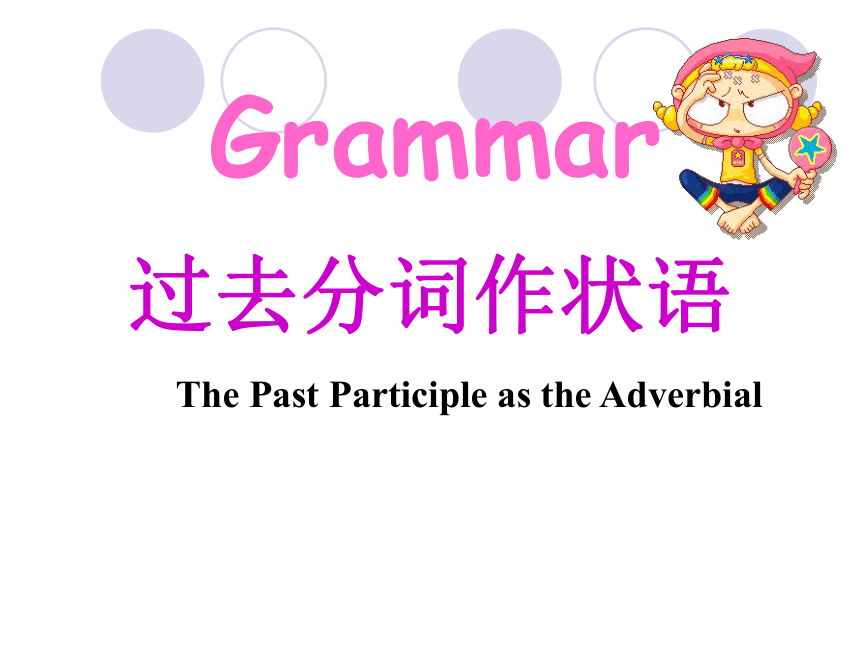

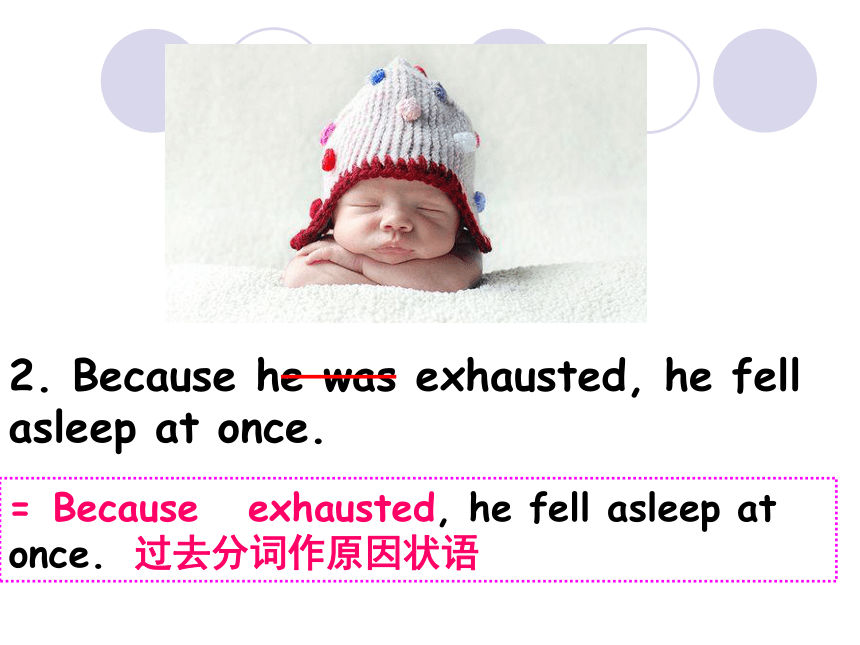
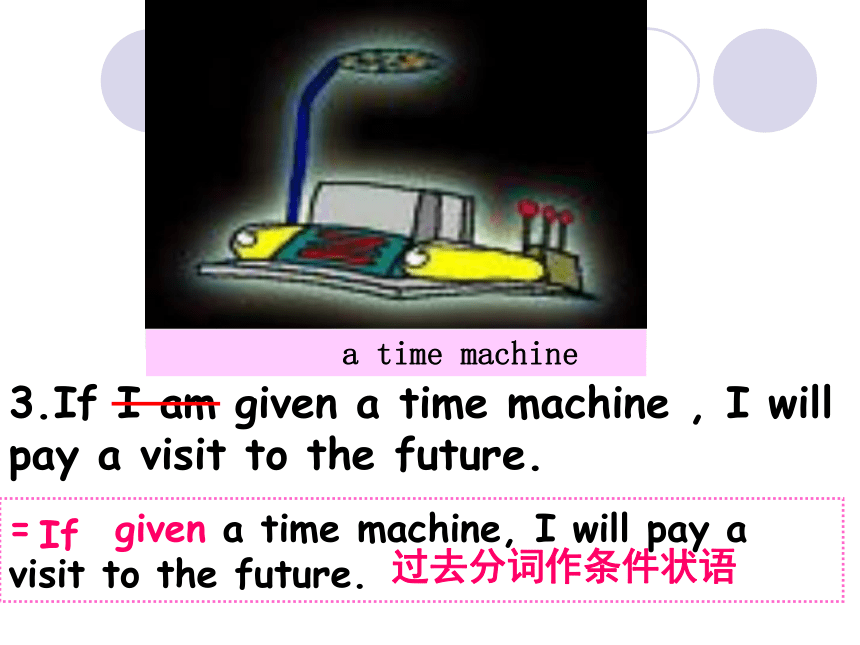

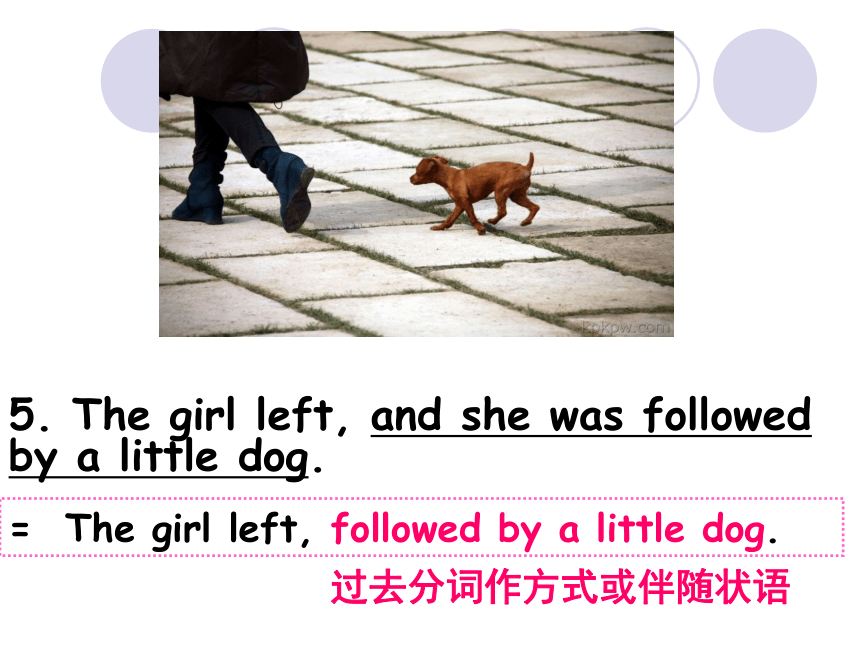
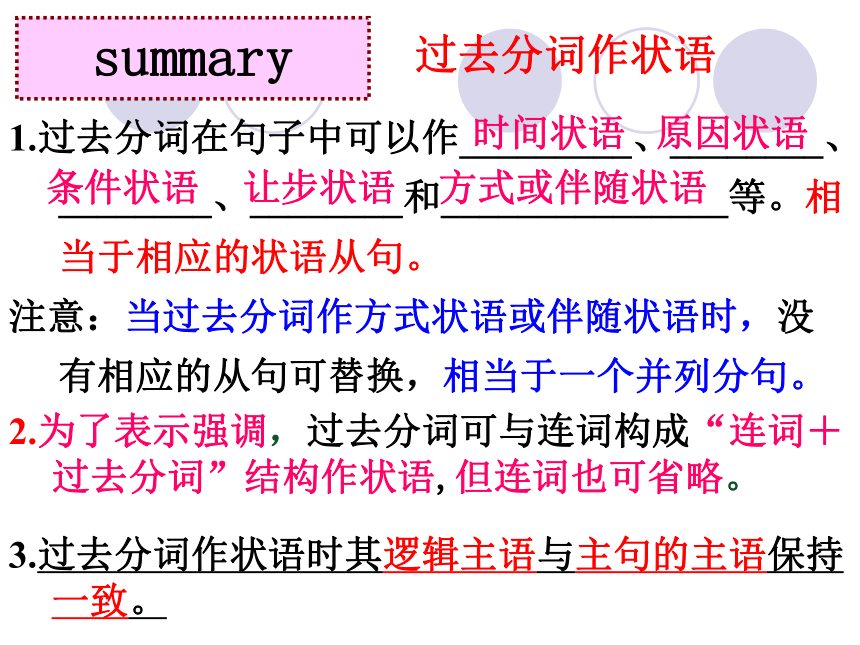
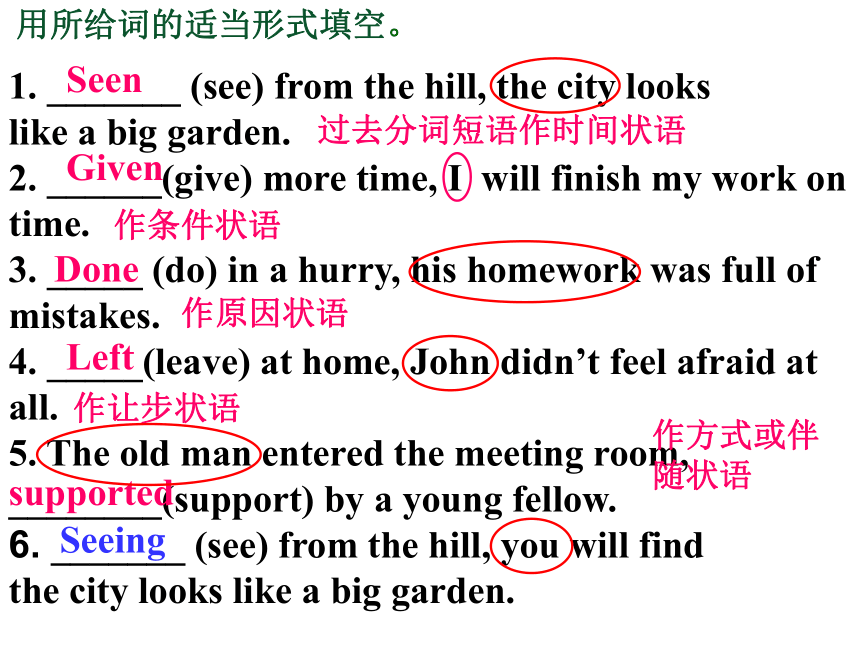
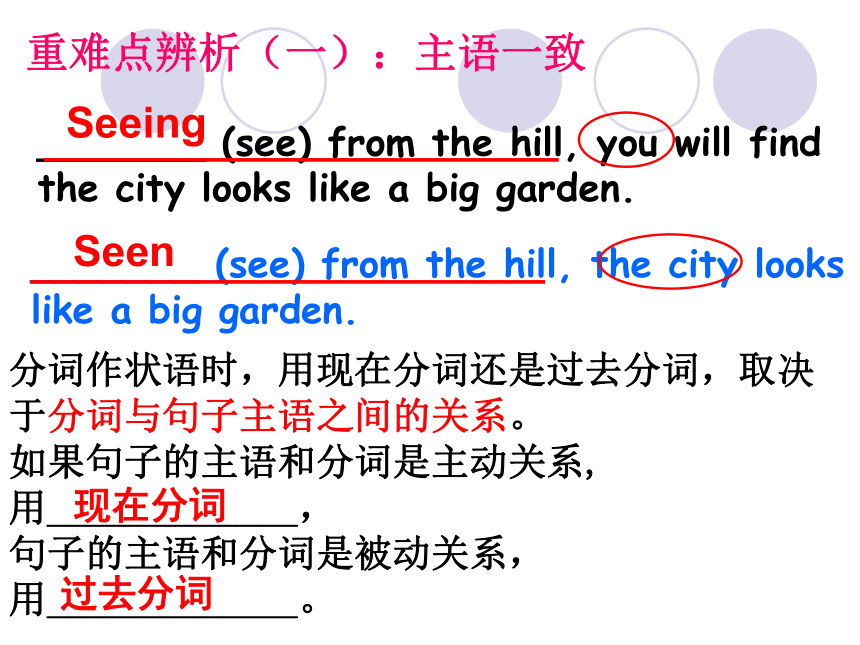
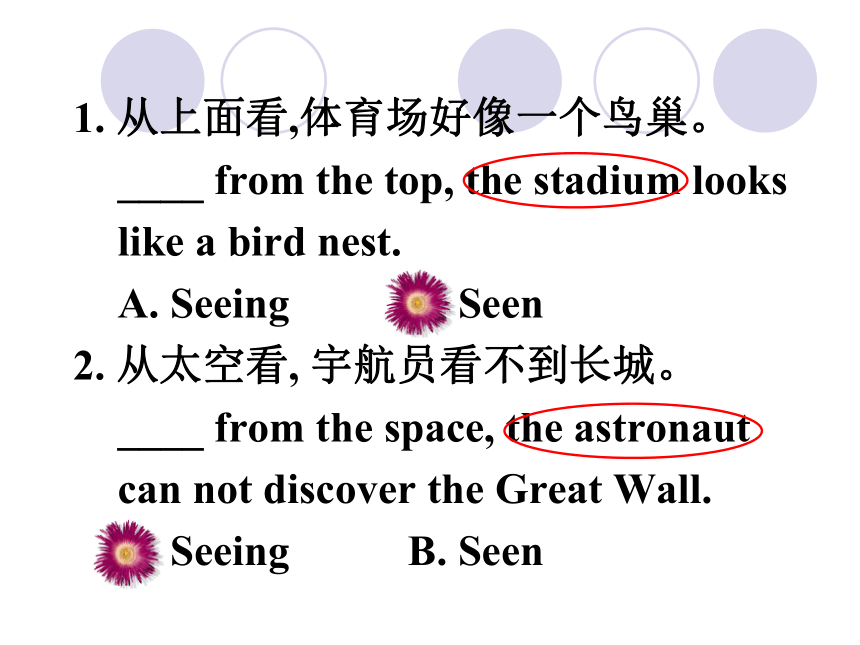
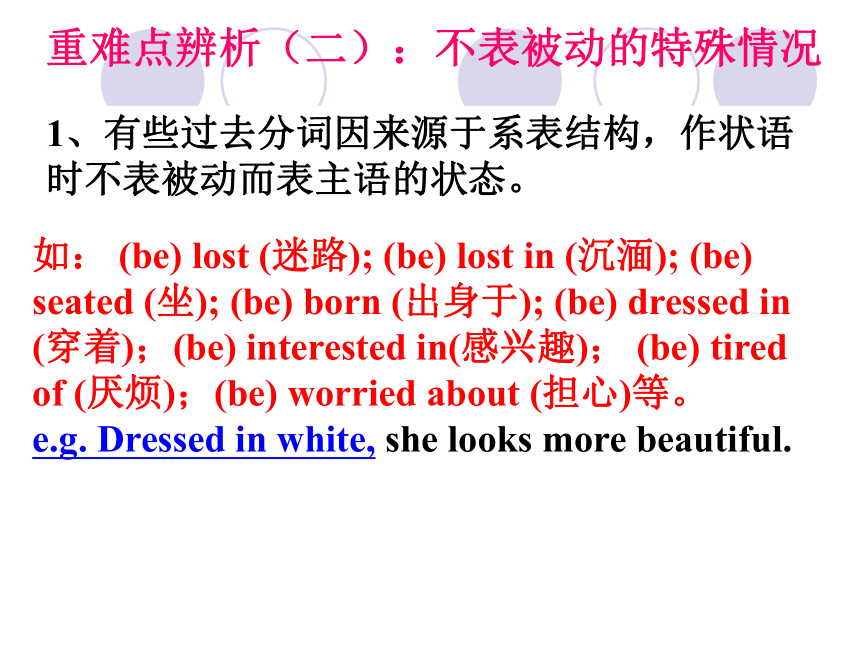
文档简介
2、由某些动词(通常是与心理感受有关的词)后面加-ed转化来的形容词也表状态不表被动。
如:frightened, satisfied, tired, disappointed等。
Please find out the past participles.
1.The stolen bike belongs to Jack.
2.The glass is broken.
3.Mary heard her name called by a stranger.
4.Asked what had happened, he told us about it.
_______
_______
______
_______
1.作定语
2.作表语
3.作宾补
4.作状语
过去分词
Revision:
Grammar
过去分词作状语
The Past Participle as the Adverbial
1.When water is heated, water turns into steam.
= heated, water turns into steam.
When
过去分词作时间状语
2. Because he was exhausted, he fell asleep at once.
= exhausted, he fell asleep at once.
Because
过去分词作原因状语
3.If I am given a time machine , I will
pay a visit to the future.
= given a time machine, I will pay a visit to the future.
a time machine
If
过去分词作条件状语
4. Although she was Laughed at by many people, she continued her study.
= laughed at by many people, she continued her study.
Although
过去分词作让步状语
5. The girl left, and she was followed by a little dog.
= The girl left, followed by a little dog.
过去分词作方式或伴随状语
过去分词作状语
summary
1.过去分词在句子中可以作_________、________、________、________和_______________等。相当于相应的状语从句。
注意:当过去分词作方式状语或伴随状语时,没有相应的从句可替换,相当于一个并列分句。
时间状语
原因状语
条件状语
让步状语
方式或伴随状语
2.为了表示强调,过去分词可与连词构成“连词+过去分词”结构作状语,但连词也可省略。
3.过去分词作状语时其逻辑主语与主句的主语保持一致。
Seen
Given
Done
用所给词的适当形式填空。
1. _______ (see) from the hill, the?city?looks
like?a?big?garden.
2. ______(give) more time, I will finish my work on time.
3. _____ (do) in a hurry, his homework was full of mistakes.
4. _____(leave) at home, John didn’t feel afraid at all.
5. The old man entered the meeting room, ________(support) by a young fellow.
6. _______ (see) from the hill, you will find the?city?looks?like?a?big?garden.
Left
supported
过去分词短语作时间状语
作条件状语
作原因状语
作让步状语
作方式或伴随状语
Seeing
_______ (see) from the hill, the?city?looks
like?a?big?garden.
分词作状语时,用现在分词还是过去分词,取决于分词与句子主语之间的关系。
如果句子的主语和分词是主动关系,
用_____________,
句子的主语和分词是被动关系,
用_____________。
现在分词
过去分词
重难点辨析(一):主语一致
_______ (see) from the hill, you will find the?city?looks?like?a?big?garden.
Seen
Seeing
1. 从上面看,体育场好像一个鸟巢。 ____ from the top, the stadium looks like a bird nest. A. Seeing B. Seen
2. 从太空看, 宇航员看不到长城。 ____ from the space, the astronaut can not discover the Great Wall. A. Seeing B. Seen
1、有些过去分词因来源于系表结构,作状语时不表被动而表主语的状态。
如: (be) lost (迷路); (be) lost in (沉湎); (be) seated (坐); (be) born (出身于); (be) dressed in (穿着);(be) interested in(感兴趣); (be) tired of (厌烦);(be) worried about (担心)等。
e.g. Dressed in white, she looks more beautiful.
重难点辨析(二):不表被动的特殊情况
e.g. Surprised at what had happened, Tom didn’t know what to do.
即学即练:
1. When __________(compare) different cultures, we often pay attention only to the differences without noticing the many similarities.
2. _________(blame) for the breakdown of the school computer network, Alice was in low spirits.
3. _________(surprise) and happy, Tony stood up and accepted the prize.
comparing
Blamed
Surprised
过去分词不表被动而表状态
分词作状语答题记忆口诀
分词作状语,主语是问题。
逗号前后两动作,共用一主语。
主语找出后,再来判关系。
主动-ing,被动用-ed。
过去分词作状语
需要注意的几个问题
1. 过去分词作状语时的位置
过去分词作状语,多放在句首;也可放在主句后面或插在句子中间,均需有逗号与主句隔开。
e.g. : Followed by his assistant, the professor walked out of the hall.
= The professor walked out of the hall, followed by his assistant.
=The professor, followed by his assistant, walked out of the hall.
由助手跟着,这位教授走出了大厅。
如:
??? If heated, _______.?
people can turn water into gas????
B. one can change ice into water
C. ice turns into water??????
D. people get water from ice
2. 过去分词的逻辑主语和句子的主语要保持一致
?若过去分词的逻辑主语与句中主语不一致,而是前面有了自己的主语,这时就构成了过去分词的独立主格结构,在句中作状语,表示时间、原因、条件、方式、伴随等 。
Their homework finished, the children went out to play football.
句子的主语
过去分词的逻辑主语
过去分词的独立主格结构,
作时间状语
3. 过去分词的独立主格结构
★4.英语中也有一些分词,其逻辑主语不是句子的主语,它们已变成固定词组,表示说话人对所说的话的一种态度。如:
judging by/from… 根据……判断;由……断定
provided/providing (that)… 假如,倘若……;given… 倘若……;假定……
generally / strictly speaking一般说来/ 严格说来
talking of / speaking of 说到,提到
all things considered 从整体来看 ,
Considering… 考虑到…
taking all things into consideration 全面看来
e.g. Given good weather, our ship will reach
Shanghai this evening.
5. 过去分词的四种形式
一般式:done不强调动作的先后关系
现在进行式:being done 强调分词的动作与谓语动词的动作同时发生
完成式:having been done 表示分词的动作发生在前,谓语动词的动作发生在后。(在不强调动作先后的情况下,常常用done代替)
将来式:to be done表示“将要被”
1. __________ (use) by me now, the bike can’t be lent to you.
2. _________________ (use) for many years, the bike need repairing.
3. ______________________ (threat) twice, the young lady called the police.
Having been threatened
Threatened
Being used
Having been used
或
6.现在分词、过去分词和不定式作状语的区别
1) v.-ing作状语时,分词表示的动作与句子主语之间构成主动关系。
e.g. Seeing from the top of the tower, we can get a wonderful view of our city.
2) v.-ed作状语时,分词表示的动作与句子主语之间构成被动关系。
e.g. Seen from the top of the tower, our city looks more beautiful.
to do作状语,一般表示目的。
e.g. To get a wonderful view of our city, we
climbed to the top of the tower.
1. Following the old man, we went upstairs. (We followed…)
(跟着那个老人, 我们上了楼。)
2. Followed by the old man, we went upstairs. (We were followed by)
(我们上了楼, 后面跟着那个老人。)
Compare
Consolidate:
________________ (如此高兴), we decided to stay two more days.
Function: _______
2) ___________________________ (十六世纪烧毁后), the castle was never rebuilt.
Function: ________
Much delighted
Burnt in the 16th century
Cause
Time
3) ________________ (被他的话所感动), I accepted his present.
Function: _______
4) _________________ (从山上看), the lake looks beautiful.
Function: _______
5) ______________ (如果吃地及时) the medicine will be quite effective.
Function: _______
Moved by his words
Seen from the hill
Taken in time
cause
Condition/time
Condition
_____ in thought, he almost ran into the car in front of him.
A. Losing B. Having lost
C. Lost D. To lose
2. If _____ the same treatment again, he’s sure to get well.
A. giving B. give
C. given D. being given
3. _____ in 1636, Harvard is one of the most famous universities in the United States.
A. Founded B. It was founded
C. Being founded D. Founding
Practice makes perfect
4. ______ with the size of the whole earth, the biggest ocean doesn’t seem big at all.
A. Compare B. When comparing
C. Comparing D. When compared
5. ______ time, he’ll make a first-class tennis player.
A. Having given B. To give
C. Giving D. Given
6. _______ in a white uniform, he looks more like a cook than a doctor.
A. Dressed B. To dress
C. Dressing D. Having dressed
7. Unless ______ to speak, you should remain silent at the conference.
A. invited B. inviting
C. being invited D. having invited
8. _____ more attention, the tree could have
grown better.
???A. Given?????? B. To give???????
C. Giving???????? D. Having given.
9. The computer center, ____ last year, is very popular among the students in this school.
A. open???? B. opening??????
C. having opened D. opened
10. The first textbooks _____ for teaching
English as a foreign language came out in the
16th century.
A. having written B. to be written??
C. being written??? D. written
11. When _____, the museum will be open to the public next year.
A. completed
B. completing
C. being completed
D. to be completed
12. _______ such heavy pollution already, it may now be too late to clean up the river.
A. Having suffered??? B. Suffering??
C. To suffer????? D. Suffered
13. The research is so designed that once ________ nothing can be done to change it.
A. begins??????????? B. having begun C. beginning? D. begun
14. The ___ morning, the father came into the lonely house, ___ by his naughty boy.
A.following, following B.followed,followed
C. following, followed Dfollowed,following
15. _____, but he still could not understand it.
A. Told many times
B. Having been told many times
C. He has been told many times
D. Though he had been told many times
2011天津卷______ into English, the sentence was found to have an entirely different word order.
A. Translating B. Translated
C. To translate D. Having translated
2011上海春招______ in 1955, Disneyland in California is regarded by many as the original fun park.
A. Opened B. Having opened
C. Opening D. Being opened
(2010) ._____ from the top of the tower, the south foot of the mountain is a sea of trees .
A. Seen B. Seeing
C. Having seen D. To see
(2010).____at my classmates' faces, I read the same excitement in their eyes.
A. Looking B. Look
C. To look D. Looked
Thanks
Homework
1. Finish Exe. 1 on page18.
2. Go over “The Past Participle as the Adverbial”.
如:frightened, satisfied, tired, disappointed等。
Please find out the past participles.
1.The stolen bike belongs to Jack.
2.The glass is broken.
3.Mary heard her name called by a stranger.
4.Asked what had happened, he told us about it.
_______
_______
______
_______
1.作定语
2.作表语
3.作宾补
4.作状语
过去分词
Revision:
Grammar
过去分词作状语
The Past Participle as the Adverbial
1.When water is heated, water turns into steam.
= heated, water turns into steam.
When
过去分词作时间状语
2. Because he was exhausted, he fell asleep at once.
= exhausted, he fell asleep at once.
Because
过去分词作原因状语
3.If I am given a time machine , I will
pay a visit to the future.
= given a time machine, I will pay a visit to the future.
a time machine
If
过去分词作条件状语
4. Although she was Laughed at by many people, she continued her study.
= laughed at by many people, she continued her study.
Although
过去分词作让步状语
5. The girl left, and she was followed by a little dog.
= The girl left, followed by a little dog.
过去分词作方式或伴随状语
过去分词作状语
summary
1.过去分词在句子中可以作_________、________、________、________和_______________等。相当于相应的状语从句。
注意:当过去分词作方式状语或伴随状语时,没有相应的从句可替换,相当于一个并列分句。
时间状语
原因状语
条件状语
让步状语
方式或伴随状语
2.为了表示强调,过去分词可与连词构成“连词+过去分词”结构作状语,但连词也可省略。
3.过去分词作状语时其逻辑主语与主句的主语保持一致。
Seen
Given
Done
用所给词的适当形式填空。
1. _______ (see) from the hill, the?city?looks
like?a?big?garden.
2. ______(give) more time, I will finish my work on time.
3. _____ (do) in a hurry, his homework was full of mistakes.
4. _____(leave) at home, John didn’t feel afraid at all.
5. The old man entered the meeting room, ________(support) by a young fellow.
6. _______ (see) from the hill, you will find the?city?looks?like?a?big?garden.
Left
supported
过去分词短语作时间状语
作条件状语
作原因状语
作让步状语
作方式或伴随状语
Seeing
_______ (see) from the hill, the?city?looks
like?a?big?garden.
分词作状语时,用现在分词还是过去分词,取决于分词与句子主语之间的关系。
如果句子的主语和分词是主动关系,
用_____________,
句子的主语和分词是被动关系,
用_____________。
现在分词
过去分词
重难点辨析(一):主语一致
_______ (see) from the hill, you will find the?city?looks?like?a?big?garden.
Seen
Seeing
1. 从上面看,体育场好像一个鸟巢。 ____ from the top, the stadium looks like a bird nest. A. Seeing B. Seen
2. 从太空看, 宇航员看不到长城。 ____ from the space, the astronaut can not discover the Great Wall. A. Seeing B. Seen
1、有些过去分词因来源于系表结构,作状语时不表被动而表主语的状态。
如: (be) lost (迷路); (be) lost in (沉湎); (be) seated (坐); (be) born (出身于); (be) dressed in (穿着);(be) interested in(感兴趣); (be) tired of (厌烦);(be) worried about (担心)等。
e.g. Dressed in white, she looks more beautiful.
重难点辨析(二):不表被动的特殊情况
e.g. Surprised at what had happened, Tom didn’t know what to do.
即学即练:
1. When __________(compare) different cultures, we often pay attention only to the differences without noticing the many similarities.
2. _________(blame) for the breakdown of the school computer network, Alice was in low spirits.
3. _________(surprise) and happy, Tony stood up and accepted the prize.
comparing
Blamed
Surprised
过去分词不表被动而表状态
分词作状语答题记忆口诀
分词作状语,主语是问题。
逗号前后两动作,共用一主语。
主语找出后,再来判关系。
主动-ing,被动用-ed。
过去分词作状语
需要注意的几个问题
1. 过去分词作状语时的位置
过去分词作状语,多放在句首;也可放在主句后面或插在句子中间,均需有逗号与主句隔开。
e.g. : Followed by his assistant, the professor walked out of the hall.
= The professor walked out of the hall, followed by his assistant.
=The professor, followed by his assistant, walked out of the hall.
由助手跟着,这位教授走出了大厅。
如:
??? If heated, _______.?
people can turn water into gas????
B. one can change ice into water
C. ice turns into water??????
D. people get water from ice
2. 过去分词的逻辑主语和句子的主语要保持一致
?若过去分词的逻辑主语与句中主语不一致,而是前面有了自己的主语,这时就构成了过去分词的独立主格结构,在句中作状语,表示时间、原因、条件、方式、伴随等 。
Their homework finished, the children went out to play football.
句子的主语
过去分词的逻辑主语
过去分词的独立主格结构,
作时间状语
3. 过去分词的独立主格结构
★4.英语中也有一些分词,其逻辑主语不是句子的主语,它们已变成固定词组,表示说话人对所说的话的一种态度。如:
judging by/from… 根据……判断;由……断定
provided/providing (that)… 假如,倘若……;given… 倘若……;假定……
generally / strictly speaking一般说来/ 严格说来
talking of / speaking of 说到,提到
all things considered 从整体来看 ,
Considering… 考虑到…
taking all things into consideration 全面看来
e.g. Given good weather, our ship will reach
Shanghai this evening.
5. 过去分词的四种形式
一般式:done不强调动作的先后关系
现在进行式:being done 强调分词的动作与谓语动词的动作同时发生
完成式:having been done 表示分词的动作发生在前,谓语动词的动作发生在后。(在不强调动作先后的情况下,常常用done代替)
将来式:to be done表示“将要被”
1. __________ (use) by me now, the bike can’t be lent to you.
2. _________________ (use) for many years, the bike need repairing.
3. ______________________ (threat) twice, the young lady called the police.
Having been threatened
Threatened
Being used
Having been used
或
6.现在分词、过去分词和不定式作状语的区别
1) v.-ing作状语时,分词表示的动作与句子主语之间构成主动关系。
e.g. Seeing from the top of the tower, we can get a wonderful view of our city.
2) v.-ed作状语时,分词表示的动作与句子主语之间构成被动关系。
e.g. Seen from the top of the tower, our city looks more beautiful.
to do作状语,一般表示目的。
e.g. To get a wonderful view of our city, we
climbed to the top of the tower.
1. Following the old man, we went upstairs. (We followed…)
(跟着那个老人, 我们上了楼。)
2. Followed by the old man, we went upstairs. (We were followed by)
(我们上了楼, 后面跟着那个老人。)
Compare
Consolidate:
________________ (如此高兴), we decided to stay two more days.
Function: _______
2) ___________________________ (十六世纪烧毁后), the castle was never rebuilt.
Function: ________
Much delighted
Burnt in the 16th century
Cause
Time
3) ________________ (被他的话所感动), I accepted his present.
Function: _______
4) _________________ (从山上看), the lake looks beautiful.
Function: _______
5) ______________ (如果吃地及时) the medicine will be quite effective.
Function: _______
Moved by his words
Seen from the hill
Taken in time
cause
Condition/time
Condition
_____ in thought, he almost ran into the car in front of him.
A. Losing B. Having lost
C. Lost D. To lose
2. If _____ the same treatment again, he’s sure to get well.
A. giving B. give
C. given D. being given
3. _____ in 1636, Harvard is one of the most famous universities in the United States.
A. Founded B. It was founded
C. Being founded D. Founding
Practice makes perfect
4. ______ with the size of the whole earth, the biggest ocean doesn’t seem big at all.
A. Compare B. When comparing
C. Comparing D. When compared
5. ______ time, he’ll make a first-class tennis player.
A. Having given B. To give
C. Giving D. Given
6. _______ in a white uniform, he looks more like a cook than a doctor.
A. Dressed B. To dress
C. Dressing D. Having dressed
7. Unless ______ to speak, you should remain silent at the conference.
A. invited B. inviting
C. being invited D. having invited
8. _____ more attention, the tree could have
grown better.
???A. Given?????? B. To give???????
C. Giving???????? D. Having given.
9. The computer center, ____ last year, is very popular among the students in this school.
A. open???? B. opening??????
C. having opened D. opened
10. The first textbooks _____ for teaching
English as a foreign language came out in the
16th century.
A. having written B. to be written??
C. being written??? D. written
11. When _____, the museum will be open to the public next year.
A. completed
B. completing
C. being completed
D. to be completed
12. _______ such heavy pollution already, it may now be too late to clean up the river.
A. Having suffered??? B. Suffering??
C. To suffer????? D. Suffered
13. The research is so designed that once ________ nothing can be done to change it.
A. begins??????????? B. having begun C. beginning? D. begun
14. The ___ morning, the father came into the lonely house, ___ by his naughty boy.
A.following, following B.followed,followed
C. following, followed Dfollowed,following
15. _____, but he still could not understand it.
A. Told many times
B. Having been told many times
C. He has been told many times
D. Though he had been told many times
2011天津卷______ into English, the sentence was found to have an entirely different word order.
A. Translating B. Translated
C. To translate D. Having translated
2011上海春招______ in 1955, Disneyland in California is regarded by many as the original fun park.
A. Opened B. Having opened
C. Opening D. Being opened
(2010) ._____ from the top of the tower, the south foot of the mountain is a sea of trees .
A. Seen B. Seeing
C. Having seen D. To see
(2010).____at my classmates' faces, I read the same excitement in their eyes.
A. Looking B. Look
C. To look D. Looked
Thanks
Homework
1. Finish Exe. 1 on page18.
2. Go over “The Past Participle as the Adverbial”.
